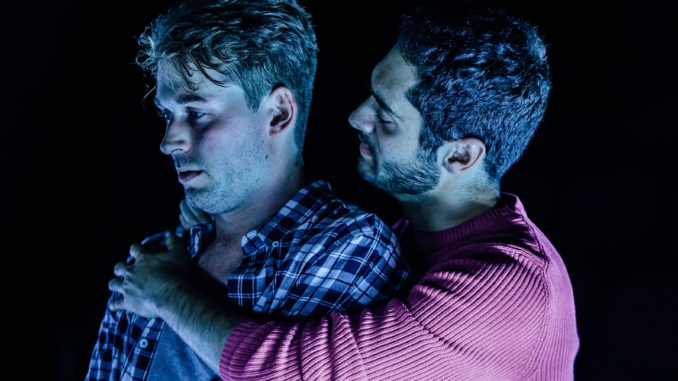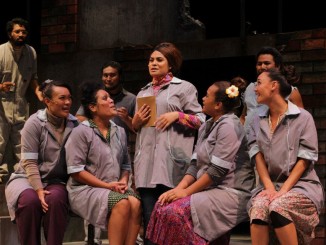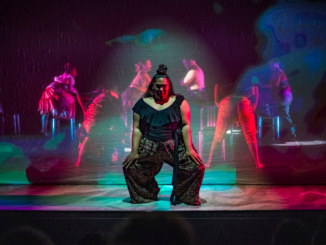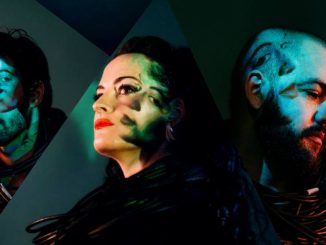
[Dive bombing into 21st Century Queer Relationships]
In Cock by Mike Bartlett, director Shane Bosher explored the sharp edges of an intimate live-in relationship between two men. Bosher builds on this with a more focused lens in Homos, or Everyone in America by Jordan Seavey: an intense, thought-provoking production grounded in the quick-witted diatribes I’ve come to expect from Bosher’s direction. The performance successfully walks the delicate line between both unsettling the audience and fostering hope in the idea that equality for the New York-based LGBTQ+ community has finally arrived.
Seavey’s script follows a non-linear pattern, placing us in the position of trying to piece together assorted memories from a set of jumbled puzzle pieces scattered across a time continuum. The audience is temporarily lost as lead actor Jack Buchanan’s Writer dazedly attempts the purchase of bath bombs at Lush in the first scene. The audience starts to make sense of the Writer’s relationship with another man in a pink sweater (The Academic, played by Arlo Green) who seems to be inexplicably drawn to the Writer with every ill-considered outburst from the moment of their first date.
From our seated positions in rising stands surrounding the rectangular stage on all four edges, we observe the Writer wax drunkenly about philosophy, suddenly flush with the self-assured confidence of what many would recognise as the oft-experienced enthusiasm born of a peculiar psychological security in learning long-established concepts. I feel a rush of concern for the dubious decision-making about drug consumption, but am also unsettled by the knowledge that this was frequently adopted by gay men in intimate relationships in Brooklyn, New York. For a moment, I feel like I’m being asked to cheer for the relationship I’m watching from on high – the actors invite us into their most intimate moments and bare their emotions in rapid succession, from highs to lows and back, and everything enroute, as the actors start to desire the flaws and strengths in each other. Scenes begin and end at breakneck speed, with each line of dialogue sharpened to maximise a sense of foreboding.
Green’s pink-clad Academic is magnetic in his pragmatic melancholy, as we watch him attract and be attracted to the Writer, an eternal perfectionist who grows more entangled in a quest for recognition of self-assured talent. This becomes clearer as the audience is plunged into scene after scene of pointed one-liners slinging across the stage, which represent the emotional turmoil that many of us experience in intimate relationships as we navigate unfamiliar territory on our own terms, pausing and returning to the arduous work of confronting how our actions impact the people around us. However, Homos calls for us to abandon societal diktats around silence regarding ‘private domestic matters’ and dive into the myriad tensions, vulnerabilities and joys that intimate relationships bring to all of our lives. Picking these apart one by one is a Herculean task for any one mind, but the cast and crew deliver on the promise of provoking individual and personal reflections on the four-letter word ‘love’, which will be received differently by every member of the audience.
The words that come to mind to describe Arlo Green’s performance include ‘haunting’ and ‘breathtaking’ – his willingness to share his trauma with an individual he trusts absolutely is a delight to watch from the stands. Jack Buchanan diligently charts the journey from foppish youth to self-aware lover in the hour and forty-five minutes of near-constant presence onstage, complementing Green’s role and demonstrating organic character growth that feels authentic on reflection. It is a testament to both leading men’s skill set that they are both convincing and compelling despite a taxing performance with no interval. At some point in the performance I felt as though I’d abruptly lost all sense of time; nothing else mattered but to find out how this relationship turned out in this moment.
Somewhere near the halfway point of the play, we see Harry McNaughton’s character, Dan, enter the story. The audience wonders what role a generic Abercrombie-and-Fitch model with a gravelly voice could have in the unfolding narrative. We promptly discard these stereotypes as Dan very deliberately reveals his vulnerability to the Academic, giving us a rare glimpse under the much sought-after sculpted skin that so many of us in LGBTQ+ communities across the globe have been taught by mass media to salivate and aspire to. I have met many Dans over the years, but this Dan in Homos presents himself as desperate for intimacy, barely concealing an element of sadness under an expansive mask of gym-toned muscle.
I am less certain as to how I feel about Harry McNaughton as an underused third vertex in Homos’ reverent portrayal of 21st-century intimate relationships between queer males. We don’t see enough healthy polygamous relationships portrayed onstage, and it is a bold decision for Homos to push the boundaries of our comfort zones by introducing Dan to the two leading men. At the same time, there are some gaps in Dan’s story, which makes his constant costuming changes a puzzling trope – does he represent a single ‘other man’, or many? I found myself wishing that more scenes were dedicated to Dan’s story, because we learn precious little about the personalities, sufferings and memories affecting the Dans in our lives. Specifically, Dan’s conversation with one protagonist outside a hospital room could have included more about Dan’s past, which would’ve improved the depth of the character, granting him as many dimensions and layers as his counterparts, rendering his role more credible.
Jane Hakaraia’s lighting design is nothing if not appropriate in a space that feels intentionally geared toward shaping the timelessness of the setting for the audience. The use of lighting changes to illustrate quick changes in moving back and forth between 2006 and 2011 illustrate the effectiveness of the execution. This decision has the effect of elevating the experience of witnessing the roller-coaster ride of the relationship between the Writer and the Academic to the boundaries of the audience’s comfort zones, in perfect rhythm with Paul McLaney’s sound design, which amplifies the impact of each scene change on the audience. The entrances and exits to each scene are slick in their execution, feeding off the action onstage and exploiting moments of no dialogue to heighten the audience’s sense of foreboding. Technical operator Ruby van Dorp is instrumental to the well-oiled delivery of the cast and crew’s first performance, which merits praise alongside the impressively-executed direction on Shane Bosher’s part.
My criticisms are somewhat minor relative to how well-crafted the presentation proved to be. Some moments came across as over-rehearsed and did not flow organically, like the moment of confession between the two leading men. While these feel more staged, contrasting against the authenticity of the ebb and flow of the relationship between the Writer and the Academic, they didn’t end up detracting from the spirit of the production. Ava Diakhaby’s cameo as the Lush store assistant is woefully underwritten, but her performance is utterly captivating in it’s subtlety and simultaneous fabulousness.
From start to finish, Homos is a gripping dive into the stormy realm of intimate relationships, making a profound statement about being true to oneself in its decision to have the two leading men wear the same costume throughout, pointedly refusing to disrobe them when depicting sex onstage. I am blown away by the immersive strength in an intimate rendition of how love between men is as much a process of navigating our own vulnerabilities, as it is a series of teachable moments about building trust in another human being. I am charmed by the decision to have the audience watch the process of desire unfold in what feels like real-time, which this production excelled at producing for the stage to mark the start of Auckland’s month of Pride in 2019.
Homos, or Everyone in America is presented by Brilliant Adventures and plays at Q Theatre until 16 February.




Leave a Reply